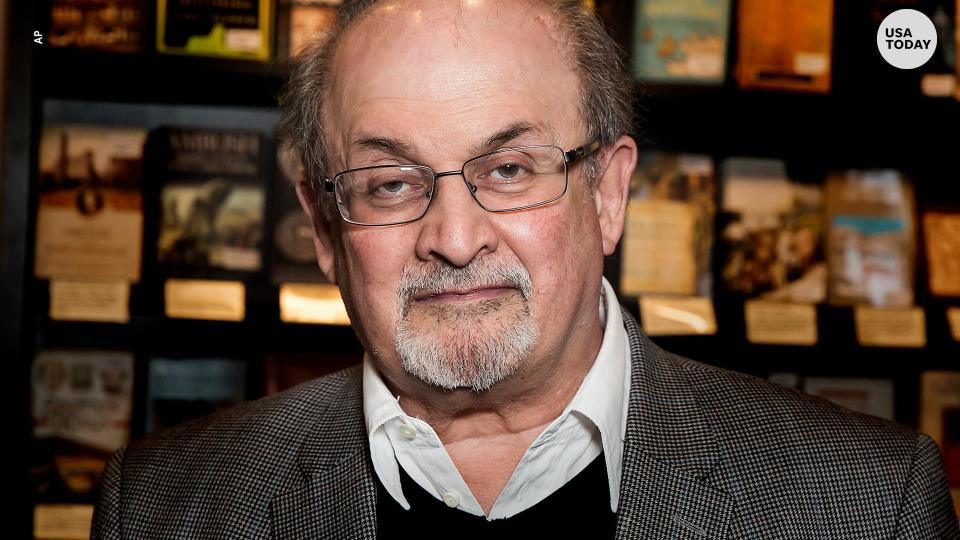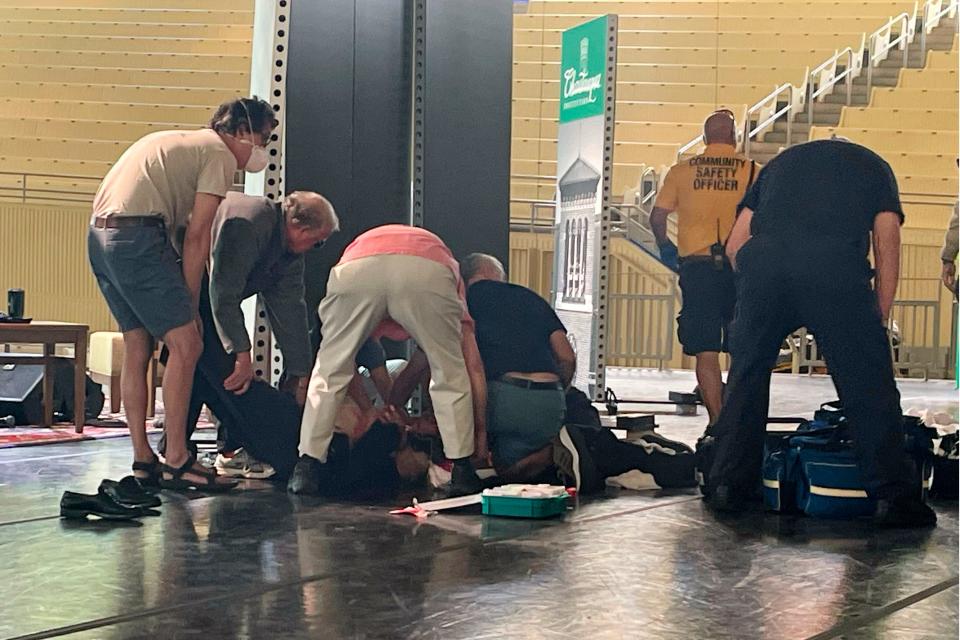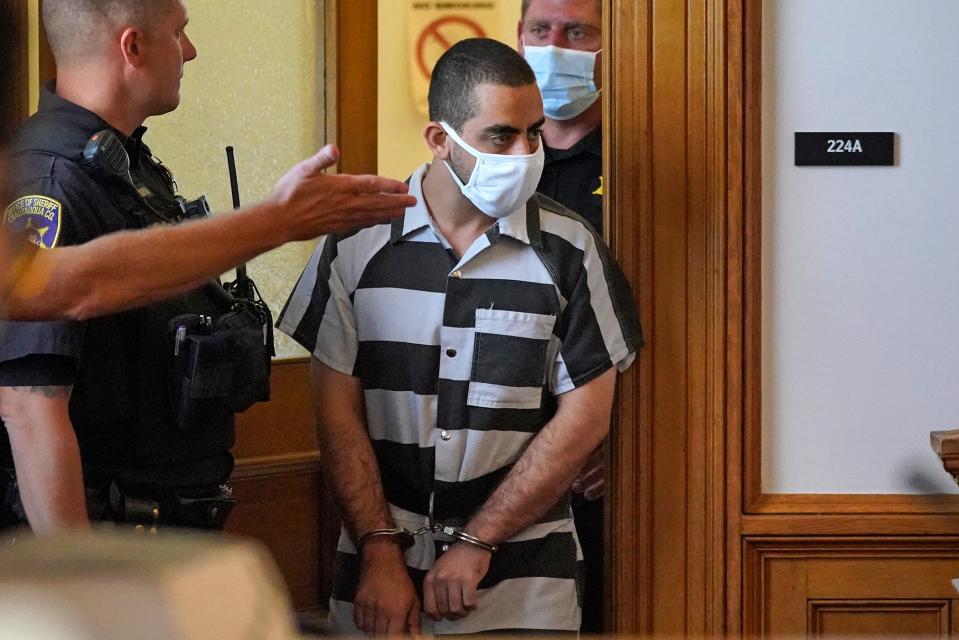Douglas Neckers: How could Rushdie attack happen in such an idyllic place?
- Oops!Something went wrong.Please try again later.
- Oops!Something went wrong.Please try again later.
I’ve been going to wonderful and stimulating programs, from lectures to concerts, at Chautauqua Institution almost my entire life. There are few places more peaceful or beautiful, and while it is nestled on 2,000 acres in southwest New York State it is far closer to Toledo — 250 miles — than to New York City.
So you can imagine my shock and horror when I learned that a famous author and naturalized American citizen, Salman Rushdie, had been attacked and severely injured in an apparent assassination attempt at Chautauqua.

Mr. Rushdie, author of the famous and controversial 1988 novel "The Satanic Verses," was repeatedly savagely stabbed on stage in the Chautauqua amphitheater Aug. 12, just as he was about to speak. As I write this, doctors say the 75-year-old author is likely to live, but may lose one eye and has other severe injuries.
But how could this happen at that beautiful intellectual place which has been nestled around Chautauqua Lake for a century and a half? There are few more idyllic places. Amish farms surround the grounds and farmers market their produce at or near the Institution most of the summer. There are usually more Amish buggies on the roads coming to the expressway than cars.
The home of famous editor Horace Greeley, (Go west, young man, go west!) is still on a dirt road 20 miles south of the Institution. Though the wolves that targeted his father’s sheep are long gone, the place otherwise looks like it must have in the 19th century, when Horace walked 50 miles from Lake Erie to get there.
Chautauqua never worried much about security; according to CNN, the Institution’s leadership had rejected recommendations for basic security measures, including bag checks and metal detectors, fearing that would change the culture at the institution.

Well, the culture now has been changed, probably forever. In retrospect, Chautauqua probably should have known better. Satanic Verses was been described as a work of “magical realism,” and it caused huge controversy among some Muslims, who accused it of blasphemy and mocking their faith. Things got worse in 1989, when the late Ayatollah Ruhollah Khomeini, then Supreme Leader, issued a fatwa against the writer.
Several assassination attempts were thwarted, and he spent a decade closely guarded and protected by the British government. For a while, things seemed to die down. But in 2017, the current Ayatollah, Ali Khamenei, reaffirmed the death sentence against Mr. Rushdie. We do not yet know exactly what motivated the would-be assassin, a 24-year-old Muslim from New Jersey.
But we probably can guess.

And so the barbarity of our current world was brought to a place where presidents have before stood. Franklin Delano Roosevelt gave his "I Hate War" speech at Chautauqua, and the unquenchable Eleanor Roosevelt spoke here often. Thomas Edison spent summers here in the 1920s and married the youngest daughter of the cofounder of it all, inventor Lewis Miller.
But beyond all that, Chautauqua had and has an importance all its own. By bringing speakers that address the world’s most critical issues, Chautauquans hear the voices of the real decision-makers — not their voices translated through editors, announcers and other media pipelines.
This is an incredibly important mission, and the Institution must not let a single assassin’s misguided acts silence those invited to its stage. Its programs must go on, because the First Amendment to the Constitution ensures freedom of speech and those chosen to speak freely at Chautauqua are so important.

Chautauqua is, however, unlike America in another way: There are more poets here than pistols. For nine weeks during the summer the Institution bustles and hums and thrives as a world of intellects that come to share their thinking.
And bizarrely, this assassin used a knife, an even more heinous and ugly route to murder. So what happens now? The world has been brought to Chautauqua. Chautauqua cannot ignore it. But it cannot let it poison its environment of peace and thought either. When this atrocity, the first in the institution’s history happened, Michael Hill, Chautauqua’s current president, said:
“We were founded to bring people together in community to learn, and in doing so, create solutions through actions to develop actions, to develop empathy and to take on intractable problems … now, we’re called to take on fear, and the worst of all human traits — hate.”
I have no doubt Chautauqua will carry on. It must, because it is one of the few centers left where people can speak freely left. Besides, Chautauqua has an exceptional role model — the Senate of the United States on Jan. 6, 2021.
So the Chautauqua of cofounder Bishop John Heyl Vincent and Thomas Edison will continue to bring poetry to a nation. Chautauqua will stand with the majority of Americans who do not believe in the minority rule of manipulated governments infecting so many states today.
It, and we who support it will believe there’s a genius in a Beethoven that is such that a great chorus singing the "Ode to Joy" from his 9th Symphony brings much more blast to the human soul than any nuclear weapon.
Somehow, Chautauqua and those who nurture it will find solutions through action. I am convinced that the poets here will beat pistols and the learned will lean on their morals and principles to carry on.
— Douglas Neckers is an organic chemist, the McMaster distinguished professor emeritus and the founder of the Center for Photochemical Sciences at Bowling Green State University, and a former board chair of the Robert H. Jackson Center in Jamestown, N.Y
This article originally appeared on The Holland Sentinel: Douglas Neckers: How could Rushdie attack happen in such an idyllic place?

